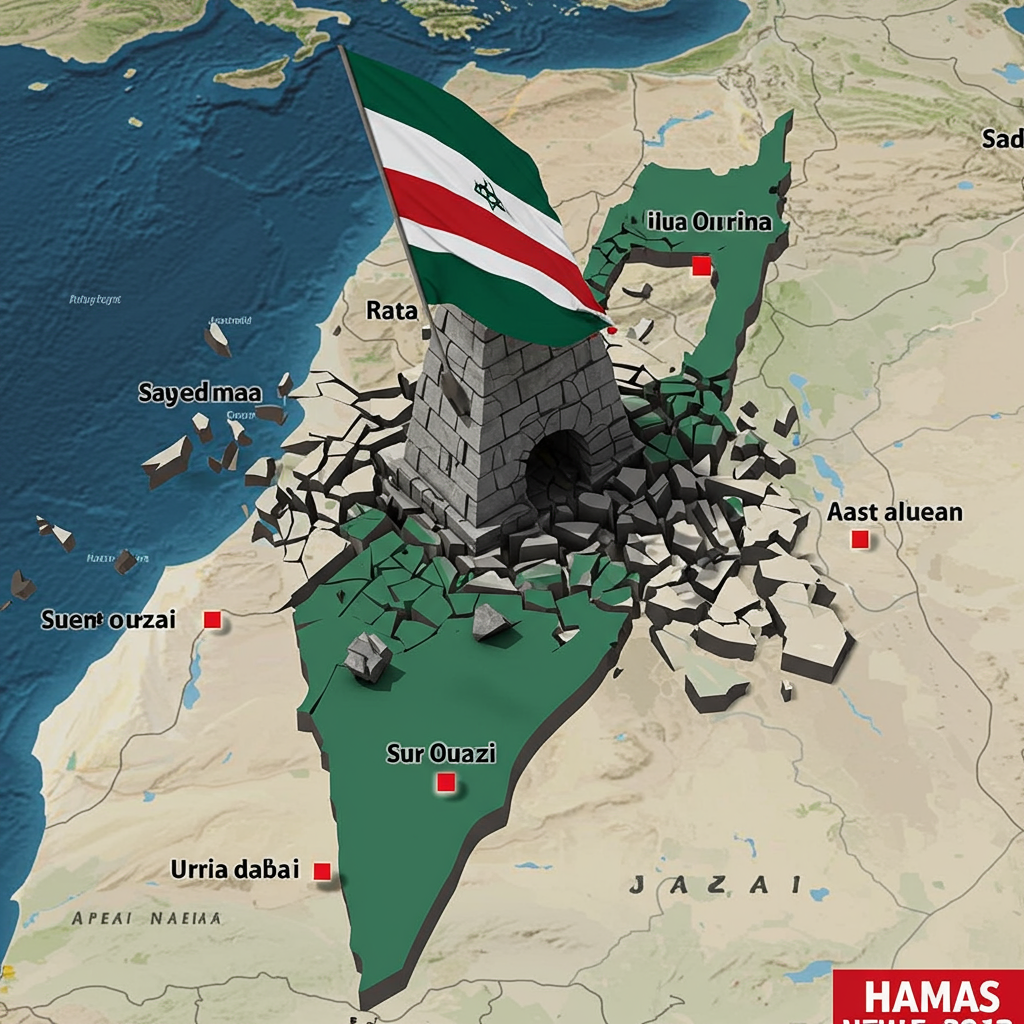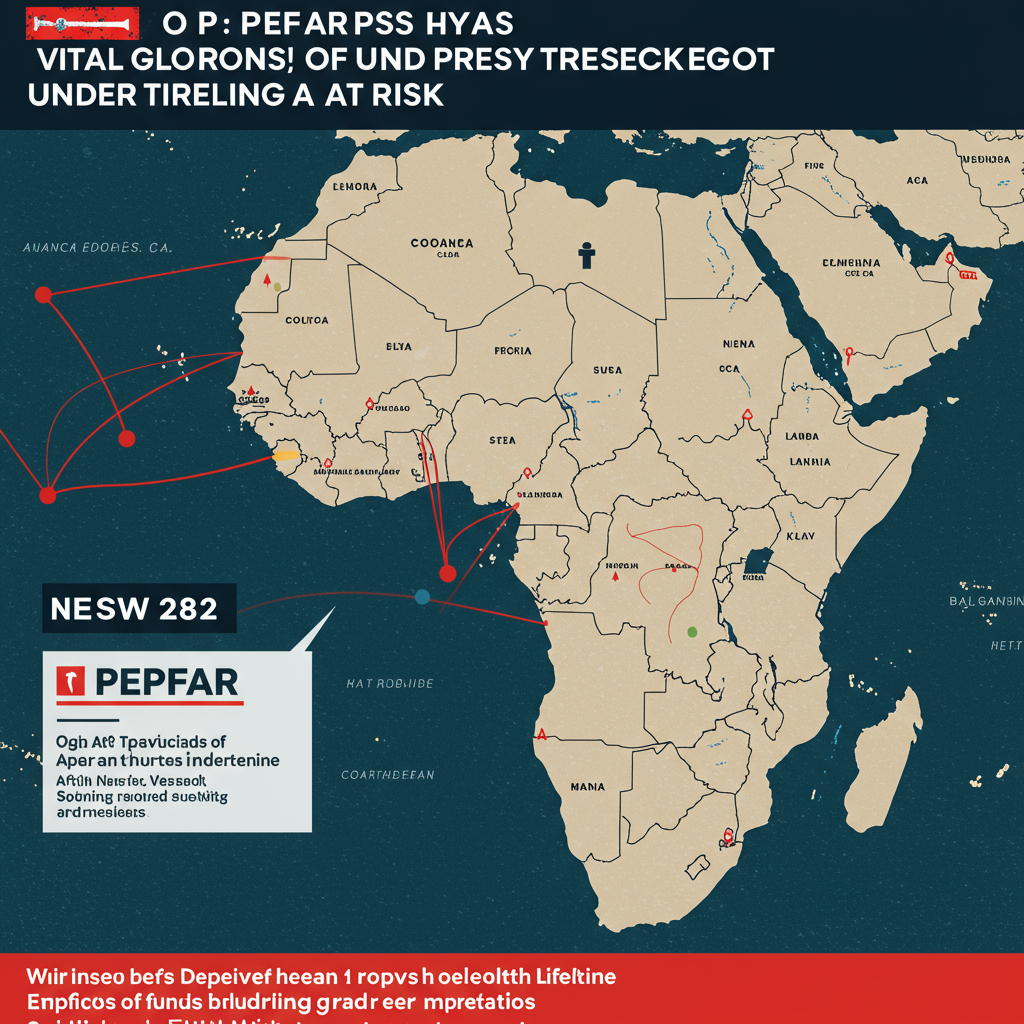A stunning new report from a senior Hamas security officer reveals the Palestinian group has lost control over most of the Gaza Strip. Speaking anonymously to the BBC, the lieutenant colonel described a complete collapse of Hamas’s command structure and security apparatus. This dramatic disintegration leaves a dangerous power vacuum across the territory. This development suggests a significant shift in the landscape of the ongoing conflict.
The officer, who was wounded early in the conflict following the 7 October 2023 attack and has stepped away from duties, painted a bleak picture of Hamas’s internal state. He shared several voice messages on condition of anonymity, detailing the severe damage sustained by the group. His insights come amidst sustained Israeli military operations in Gaza.
Decades of Control Erodes: Hamas’s Security Structure Crumbles
According to the high-ranking security official, Hamas has lost approximately 80% of its control over the Gaza Strip. This significant loss is attributed directly to months of relentless Israeli strikes. These operations have systematically targeted and devastated Hamas’s political, military, and security leadership structures.
The officer was stark in his assessment of the human toll on the organization. He claimed that the group’s command and control system had effectively collapsed. An astonishing 95% of the leadership figures in the security apparatus are now dead, he stated. The most active and prominent figures have all been killed in the fighting. This has left the remaining security structure barely functional.
The Impact of Sustained Pressure
The lieutenant colonel posed a rhetorical question about the conflict’s continuation. “Logically, it has to continue until the end,” he stated. He sees the conditions aligned for this outcome. Israel holds the upper hand militarily. International and Arab regimes remain largely silent on the situation. Criminal gangs are proliferating across the territory. Society itself appears to be collapsing under the strain.
This assessment echoes previous statements from Israeli officials. In September, Israel’s then-defence minister claimed Hamas “as a military formation no longer exists.” He suggested the group was primarily engaged in guerrilla warfare tactics by that point.
The Hamas officer did indicate the group attempted to recover. He mentioned efforts to reorganize political, military, and security councils. This attempt occurred during a 57-day ceasefire with Israel earlier in the year. However, this period of relative calm ended in March. Since then, Israel has resumed targeting Hamas’s remaining command structures. This renewed pressure has left the group in disarray.
A State of Anarchy: Looting and Lawlessness Prevail
The officer’s description of the security situation was unambiguous. He declared that it has “completely collapsed.” Control is totally gone throughout Gaza, he stated. There is no authority present anywhere to maintain order.
A dramatic example illustrates this breakdown. People reportedly looted the most powerful Hamas security apparatus building. This was the Ansar complex. Hamas used this facility to govern Gaza before the conflict. The scale of the looting was extensive. They took everything from the offices. This included mattresses and even zinc panels. Crucially, nobody intervened to stop them. There were no police present. There was no security response whatsoever. This incident starkly demonstrates the vacuum of authority.
This severe security vacuum has led directly to another alarming development. Gangs or armed clans are now “everywhere,” according to the officer. These groups operate with impunity across Gaza. They could stop individuals on the street. They could even kill them. There would be no intervention from any authority.
Compounding the problem is a chilling claim about attempts to resist. The officer alleged that anyone who tried to act independently, such as organizing resistance against thieves, was targeted. He claimed Israel bombed such efforts within half an hour. This situation effectively deters any local initiatives to restore order.
The officer summarized the dire state simply. The security situation is “zero,” he said. Hamas’s control is also “zero.” The group lacks leadership. There is no effective command structure remaining. Communication channels are broken. Even paying remaining personnel is difficult. Salaries are delayed. When they do arrive, they are barely sufficient to survive. Tragically, some people have died just trying to collect them. He concluded that it is a “total collapse.”
Internal Threats: Clan Leaders Challenge Hamas
In this environment of chaos and lawlessness, new power brokers are emerging. Six armed groups affiliated with powerful local clans have stepped forward. According to the anonymous officer, these groups are serious contenders to fill the power vacuum left by Hamas.
These clan-based groups possess significant resources. They have access to money. They hold weapons caches. They can command men. They are reportedly active across all of Gaza. Their presence is particularly felt in the southern areas.
One figure stands out among these emerging clan leaders. Yasser Abu shabab has attracted considerable attention. He is a key figure within one of these armed groups. His activities have drawn interest from the Palestinian Authority (PA). The PA is based in the occupied West Bank. It is a long-standing rival to Hamas. Regional players are also watching Abu Shabab closely, particularly Egypt.
Crucially, Israel confirmed last month that it was supplying weapons to Abu Shabab. This suggests a potential alignment of interests between Israel and certain clan leaders. Israel’s goal appears to be to weaken Hamas further by empowering internal rivals.
Sources in Gaza have reportedly told the BBC that Abu Shabab is actively working to coordinate with other armed groups. The objective is to form a joint council. The ultimate aim of this council would be to topple Hamas rule in the territory.
A retired Palestinian security official, now living in Cairo, echoed this view. He had experience countering Hamas’s military wing in 1996. This official believes Abu Shabab’s network is gaining traction. He described Abu Shabab’s group metaphorically. It is “like an orphaned child,” he said. This is a child everyone will want to adopt if he succeeds in undermining Hamas.
This official also claimed that, despite public denials, key players are engaging with these groups. He alleged that Abu Shabab has met a senior Palestinian intelligence officer three times. He also claimed Abu Shabab sent messages to the Egyptians via relatives in Sinai. The retired official added that Abu Shabab “maintains good ties with Mohammad Dahlan’s camp.” Dahlan is a former Gaza security chief. He has lived in exile since a falling out with PA President Mahmoud Abbas years ago.
The Stakes: Hamas’s Deep Fear
The anonymous Hamas security officer highlighted the group’s intense fear of figures like Yasser Abu Shabab. Hamas is “willing to do anything” to eliminate him, the officer warned. This readiness stems not from Abu Shabab’s current military strength. Rather, it comes from the fear that he could become a symbol. This symbol could potentially rally all of Hamas’s numerous adversaries.
Hamas has made enemies everywhere over the past 17 years of ruling Gaza. If someone like Abu Shabab can successfully rally these forces, the officer believes, that could signal “the beginning of the end for us.” The group’s concern is so significant that the officer claimed Hamas fighters might prioritize hunting Abu Shabab. This hunt could even take precedence over engaging Israeli tanks, a telling indicator of their internal anxieties.
The situation in Gaza continues to deteriorate. Lawlessness is increasing. Entire neighborhoods are reportedly falling under the rule of gangs or armed clans. Hamas finds itself under immense pressure. This pressure comes not only from ongoing Israeli military operations. It also originates from rising rivals within Gaza itself. These internal forces are vying for power in the security vacuum created by the conflict.
The Security Collapse Amidst Ongoing Conflict and Diplomacy
The severe internal breakdown reported by the Hamas officer is occurring within the broader context of the relentless Israel-Gaza conflict. Since the initial Hamas-led attack on October 7, 2023, the region has seen unprecedented devastation. Casualty figures have been staggering. According to Gaza’s Health Ministry, over 57,000 Palestinians have been killed. More than half of these fatalities are reported to be women and children.
Efforts to achieve a ceasefire and secure the release of remaining hostages continue, albeit with difficulty. US-led initiatives have seen fluctuations in momentum. Israeli Prime Minister Benjamin Netanyahu has reiterated his objectives: bringing back hostages and ensuring Gaza “will no longer pose a threat to Israel.” This includes eliminating Hamas’s military and governing capabilities. The reports from the anonymous officer suggest that, from Hamas’s internal perspective, significant progress has indeed been made toward dismantling their capabilities, albeit at a terrible human cost.
The reports of rising lawlessness and the emergence of powerful, armed clans complicate any future governance or security arrangements for Gaza. With Hamas’s authority severely eroded, the question of who will control the territory, restore order, and manage essential services becomes increasingly urgent and complex. The landscape of power in Gaza is clearly undergoing a dramatic and violent transformation, as described by those experiencing it firsthand.
Frequently Asked Questions
What caused Hamas’s security control in Gaza to collapse?
According to a senior Hamas security officer, the collapse is primarily due to months of Israeli strikes. These operations have systematically targeted and eliminated most of Hamas’s political, military, and security leadership. The officer claimed about 95% of key security figures are dead. This extensive loss of leadership and command structure has left the security apparatus barely functional, leading to a significant loss of control across the territory.
Who is Yasser Abu Shabab and why is he significant in Gaza?
Yasser Abu Shabab is identified as a key figure among emerging armed clan groups in Gaza. These groups are gaining power in the vacuum left by Hamas. Abu Shabab is significant because he has attracted attention and potential support from external players, including the Palestinian Authority, regional actors like Egypt, and notably, Israel, which confirmed supplying him with weapons. He is reportedly working to unite various clan groups to challenge and potentially overthrow Hamas, making him a major internal rival.
What is the current security situation like in Gaza following the collapse of Hamas control?
The security situation is described as having “completely collapsed.” With Hamas having lost control, a security vacuum exists. This has led to widespread lawlessness and the proliferation of armed gangs and clans. These groups are reportedly operating with impunity, engaging in activities like looting. There is no police or security presence to maintain order, creating a dangerous environment for residents.



